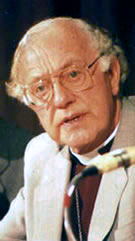![Albrecht Dürer [Public domain], via Wikimedia Commons](https://mitchellcalled.files.wordpress.com/2014/08/praying_hands_-_albrecht_durer.png?w=200&h=300)
Albrecht Dürer [Public domain], via Wikimedia Commons
. Luke 11:1 (NEB)
I cannot imagine that, before this request, the disciples had never prayed and now they sought enlightenment. In this case, ignorance was not bliss – and they were sure the Master had the remedy. Lord, teach us to pray as John taught his disciples. They were not disappointed. Part of Jesus’ response was to give us what is known as the Lord’s Prayer:
Our Father in heaven, Hallowed be your name …
It is more than likely that, as opportunities arose, Jesus took his disciples aside and shared with them his understanding of the Life of Faith and, within that context, the life of prayer would certainly feature.
The name Roland Walls was unknown to me until some years ago I found him on the shelves of my local library by chance. (Biography is my favourite reading.) I had forgotten all about him until I read a review of the recent publication of the book A simple life: Roland Walls and the Community of the Transfiguration. John Miller, the author, writes “Roland taught a generation how to pray and how to live both simply and joyfully.” It was not just what he said but how he lived the kind of life that convinced his students and friends that he was not just an academic but of being spiritual, a man of dedicated prayer. When I think of Roland Walls, I find it easy to transfer my thoughts to Jesus and his response to his disciples’ prayer request. Living with him every day, watching him in all sorts of situation, listening to his private talk, being admitted to sharing his dreams and hopes, they would gradually come to see things as Jesus saw them. In the fellowship of that small disciple band they would be witness to Jesus at prayer; at times listening in to some of Jesus’ intimate conversations with the Father and so learning the art of prayer. It seems to me there might be two ways of understanding what Jesus’ men were asking when they based their request on the witness/testimony of John’s followers, viz. the obvious impact of prayer determining the commitment and the shape of a dedicated life style, to treat it simply as a matter of reporting a historic fact. On the other hand might there not be more to it? Namely, the disciples were impressed by the astonishing impact and the remarkable influence of prayer. And they did not wish to miss out. Hence, teach us to pray like John did with his flock.
Prayer is the Christian’s vital breath, the Christian’s native air
< < < > > >
Lord, we welcome you into our lives, we want to point our fellow men and women to you, fill us with your Spirit, set our hearts aflame with a passion to do the works of your kingdom – but, be gentle with us, go slowly with us, do not ask for anything too radical. You know what we mean, you understand, you came to comfort not to discomfort. What is that you say? If you are with me, deny yourself, take up your cross and follow. Lord, you got a handful when you chose us. Do not let it stop you from using us – minds and hearts are open. Amen.
< < < > > >
God, there are valleys in life into which we may stray where there do not appear to be any promises of sunlight after rain. It is dark – we tremble with fear. Faith does not appear strong enough to hold us. How silly we are; we have been here before: come out of it, found you because you have never left us. God, light shines again – we are unscathed: relief, deliverance, gratitude. God, time marches on – all is well, we forget. How mysterious, are your thoughts to me, how vast in number they are – your goodness and love unfailingly follow me, keep us ever praising.
< < < > > >
Praying some sayings of Jesus – follow each saying with the response: Lord, this is your word. Make us to be like you.
Jesus said: I did not come to invite righteous people, but sinners.
Jesus said: What does one gain by winning the whole world at cost to one’s true self?
Jesus said: Whoever does not accept the kingdom of God like a child will never enter it.
Jesus said: Anyone who wishes to be a follower of mine must leave self behind, take up his cross, and come with me.
Jesus said: Father, all things are possible to you, take this cup away from me. Yet not my will but yours.
Father help us to follow your good example in humility and obedience. Amen.

![Jeremiah by Rembrandt [Public domain], via Wikimedia Commons](https://mitchellcalled.files.wordpress.com/2015/03/472px-rembrandt_harmensz__van_rijn_-_jeremia_treurend_over_de_verwoesting_van_jeruzalem_-_google_art_project.jpg?w=236&h=300)
![Dietrich Bonhoeffer: Bundesarchiv, Bild 146-1987-074-16 / CC-BY-SA [CC BY-SA 3.0 de (http://creativecommons.org/licenses/by-sa/3.0/de/deed.en)], via Wikimedia Commons](https://mitchellcalled.files.wordpress.com/2015/03/bundesarchiv_bild_146-1987-074-16_dietrich_bonhoeffer.jpg?w=94&h=150)
![The preaching of St Paul at Ephesus. Eustache Le Sueur [Public domain], via Wikimedia Commons](https://mitchellcalled.files.wordpress.com/2014/10/505px-eustache_le_sueur_-_the_preaching_of_st_paul_at_ephesus_-_wga12613.jpg?w=252&h=300)
![Albrecht Dürer [Public domain], via Wikimedia Commons](https://mitchellcalled.files.wordpress.com/2014/08/praying_hands_-_albrecht_durer.png?w=200&h=300)



